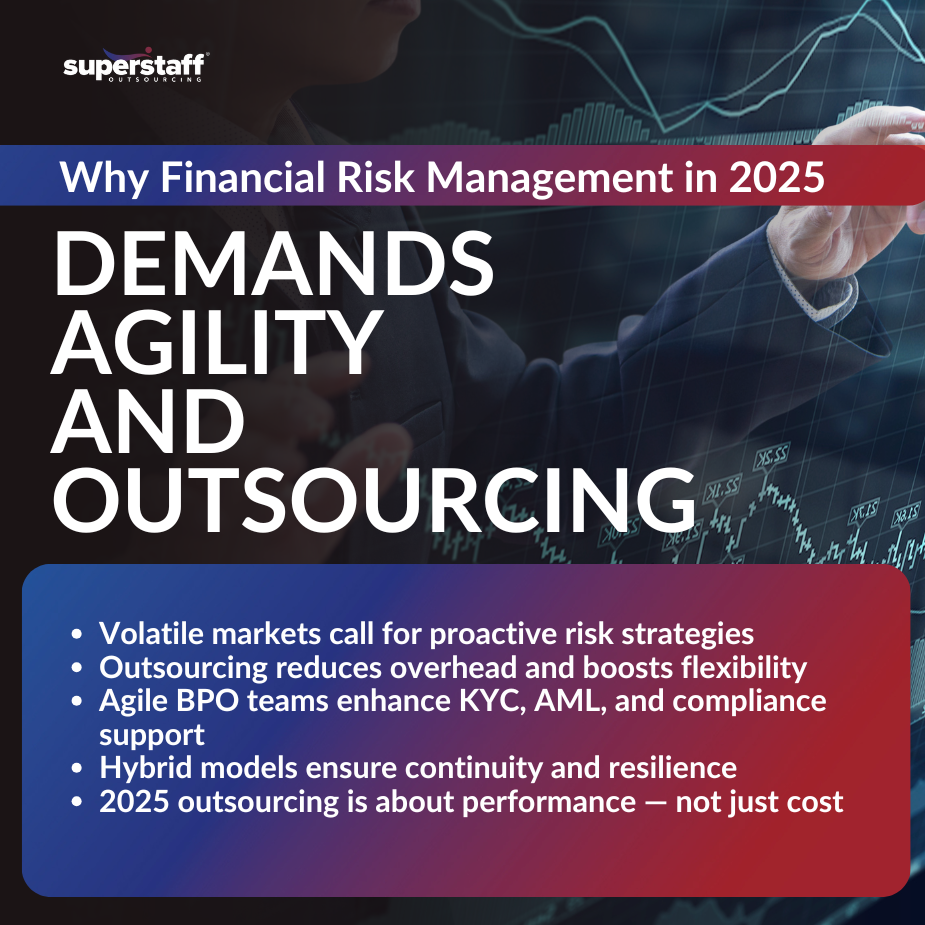
From shifting monetary policy to heightened regulatory oversight and escalating cybersecurity risks in financial services, today’s financial players find themselves operating in a perfect storm of volatility. Interest rate hikes, inflation, geopolitical tensions, and the aftermath of past economic shocks continue to cast long shadows over global financial systems.
As a result, institutions are now doubling down on their financial risk management in 2025. Strategic shifts are underway — not only to meet compliance requirements but to stay agile and competitive amid unpredictability.
This blog explores why operational agility and financial crisis preparedness strategies are now board-level priorities and how outsourcing empowers institutions to meet these challenges.
Our purpose is clear: Help decision-makers strengthen resilience while maintaining flexibility in a landscape defined by rapid change.
Economic and regulatory instability are forcing financial institutions to rethink risk frameworks.
Global financial leaders are navigating headwinds on multiple fronts. On one side, rising interest rates and inflationary pressures are pushing borrowers — and lenders — to their limits. On the other, financial regulators are enforcing stricter rules through evolving Basel III and Basel IV frameworks, compelling banks and insurers to rethink their capital strategies and liquidity buffers.
These challenges are exacerbated by the growing need for comprehensive financial risk management in 2025. Financial institutions must implement more proactive and dynamic strategies for financial risk mitigation in uncertain markets.
- Volatile lending environments are increasing default risks, demanding real-time assessments of credit exposure and risk mitigation strategies.
- Evolving Basel III/IV requirements are redefining how capital adequacy and liquidity are calculated, pushing institutions to upgrade compliance tools and protocols.
- Heightened scrutiny from U.S. regulators and international watchdogs is amplifying the need for airtight processes and proactive compliance.
To respond effectively, institutions need more than updated policies — they need systems built for adaptability.
Agility is no longer a luxury — it’s a prerequisite for competitive survival.
In this new landscape, the ability to pivot quickly has become a competitive advantage. Whether adapting to new regulations, responding to cyber threats, or launching new services, agility makes or breaks an institution’s success.

- Faster KYC (Know Your Client) onboarding means less friction for new clients and lower abandonment rates.
- Adaptability to shifting data privacy laws is critical as rules vary across jurisdictions and evolve rapidly.
- Scalability allows firms to ramp operations up or down without overcommitting resources.
Agility also supports customer experience, helping firms maintain service levels even during surges in demand. But achieving this level of flexibility often requires more than internal resources can provide.
That level of agility often requires external support — and outsourcing delivers just that.
Outsourcing helps financial institutions manage risk while enhancing agility.
Outsourcing used to be seen as a cost-saving tactic. In 2025, it’s a strategic enabler of resilience and speed. Specialized BPO partners bring industry know-how, tech fluency, and scalable teams trained to handle mission-critical functions. These partners don’t just offload tasks — they become a seamless extension of your operations, providing depth in talent and capacity during peak periods or crises.
Modern outsourcing firms understand the complexity of financial workflows and regulatory pressure. They aren’t just manpower providers — they’re strategic collaborators embedded with a culture of continuous improvement. The best BPO partners operate like in-house teams, leveraging industry benchmarks, AI-driven tools, and compliance best practices to deliver end-to-end support.
- Outsourced teams for transaction monitoring and AML reviews bring expertise and objectivity to sensitive processes. These teams stay updated on evolving threat patterns, enabling early detection and faster response to suspicious activities. Their external perspective helps uncover gaps in internal monitoring systems while ensuring regulatory alignment.
- KYC processing support accelerates onboarding while reducing error rates and ensuring compliance. The result: streamlined customer acquisition, better audit preparedness, and lower operational risk. With standardized processes, dual-control workflows, and trained personnel, outsourced KYC teams uphold compliance while improving client onboarding experiences.
- Data entry, customer service, and IT support give firms the bandwidth to focus on risk strategy rather than operational maintenance. Whether it’s handling a spike in customer queries or resolving backend discrepancies, outsourced teams provide continuity without bloating in-house headcount. More importantly, they free up your most talented personnel to lead innovation, policy design, and data-driven risk frameworks.
By delegating non-core functions, financial institutions free up internal teams to focus on innovation, strategy, and high-stakes decision-making. These BPO partnerships also support continuous improvement through KPIs, quality audits, and real-time reporting — ensuring the back office isn’t just functional, but future-ready.
Operational resilience starts with the right partner, not just the right tech.
Technology plays a vital role in risk management, but it’s not a silver bullet. People and processes must work in tandem with digital tools to ensure continuity and compliance. That’s where outsourcing shines — not just in execution, but in foresight, process design, and adaptability during turbulent times.
What separates a resilient institution from a reactive one is often not infrastructure alone — but the caliber of its partners. When systems go down, when policies shift overnight, or when volumes spike unpredictably, it’s human readiness and coordination that make the difference. Leading outsourcing providers offer cross-trained teams, pre-approved contingency protocols, and a deep bench of support talent that can be deployed within hours.
- Offshore and nearshore teams trained in financial protocols can integrate seamlessly with internal operations. These teams bring deep industry understanding, adhere to institutional values, and reinforce existing workflows without friction. Their fluency in compliance language and financial documentation reduces the learning curve and boosts efficiency.
- Regulatory alignment across markets ensures BPO partners maintain the same standards of compliance required by banks and insurers. Many BPOs undergo the same certifications and audits, making them reliable extensions of internal compliance departments. They also track local laws, global mandates, and enforcement trends to ensure your institution doesn’t fall behind.
- 24/7 support means operations stay online during crises, outages, or sudden surges in demand. Whether it’s supporting late-night transactions or responding to real-time fraud alerts, a follow-the-sun model ensures uninterrupted service. This round-the-clock availability also supports customer trust and satisfaction, two critical metrics in financial brand reputation.
A hybrid model of in-house and outsourced talent ensures continuity even during natural disasters, cyberattacks, or political instability. Redundancies are built-in, disaster recovery plans are tested, and infrastructure spans geographies to reduce single points of failure. Whether you’re scaling up for regulatory audits or scaling down during market contractions, you stay covered.
This hybrid model positions firms to absorb shocks and maintain service levels — even in uncertain times. It’s no longer just about surviving disruptions; it’s about being ready for them before they strike — and having the trained hands to steer through them.
In 2025, outsourcing is not just a cost-saver — it’s a resilience enabler.
As volatility becomes a constant, financial institutions are embedding outsourcing into long-term strategies. It’s no longer about temporary fixes. It’s about building operations that can weather any storm and seize opportunity when others are paralyzed.
- Reduces fixed overhead by converting functions into variable costs. This flexibility gives CFOs breathing room and agility in resource allocation without compromising service quality. It also protects the balance sheet from bloated operational expenses during downturns.
- Ensures continuity even when geopolitical conflicts or economic disruptions hit home. Outsourcing diversifies your operational footprint and safeguards service delivery when localized operations are vulnerable. The geographic spread also helps hedge against single-country risk.
- Enhances scalability and security, giving institutions the power to respond instantly without sacrificing quality. Leading BPOs invest in cybersecurity, compliance tech, and cloud-based solutions to meet modern demands. Their infrastructures often exceed what midmarket firms can afford to build alone.
Forward-thinking firms are already shifting away from reactive outsourcing to proactive partnerships that support long-term growth and stability. These collaborations come with strategic planning, process innovation, and aligned incentives to continuously evolve and improve. The result: not just outsourced tasks, but empowered ecosystems built to anticipate risk and respond in real time.
Risk may be inevitable, but with the right support, disruption doesn’t have to mean disaster. Outsourcing, when done right, becomes a force multiplier — giving institutions the stability to plan ahead and the agility to pivot when needed. In a world of constant uncertainty, that kind of readiness is no longer optional — it’s essential.
Financial Risk Management in 2025: Future-Proofing Your Bottom Line
In 2025, the only constant in finance is change. Rising interest rates, regulatory uncertainty, and global instability are redefining the rules of engagement. Financial institutions must evolve quickly — and strategically.
Risk and volatility in 2025 are pushing financial institutions to evolve — and outsourcing is a strategic way to stay strong and agile.
From compliance to customer service, outsourcing helps banks and fintechs manage risk, improve agility, and maintain performance under pressure.
Ready to make your financial institution more resilient? Explore how outsourcing can help you manage risk without losing momentum. Partner with a provider like SuperStaff that understands your industry and is built to scale with your needs.






